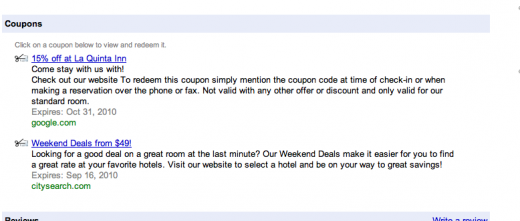Understanding Google My Business & Local Search
Google Places Coupons Now Integrating Coupons from CitySearch
It appears that Google is bulking up Places Pages with coupons from CitySearch. I had not seen any third party coupons in Places previously but according to Google the ability for “various partners to make coupons and other content available on the Place page has been available for some time”.
 I ran across the coupon sharing when the owner of the La Quinta Inn Sedona in Arizona noted in the forums that:
I ran across the coupon sharing when the owner of the La Quinta Inn Sedona in Arizona noted in the forums that:
I’ve got a citysearch coupon showing up in my coupons section. I did not authorize any city search coupon and it is a SCAM and its causing problems with customers because they are seeing this stay for $45 a night coupon valid through to sept 16th. IF this is what things are going to be like when you sign up for google places then no. I will end the account today I will not put up with crap like that. These are dishonest b/s scam ads that are placed in a coupon section knowing it will cause problems.
Obviously not all of the kinks are worked out just yet. CItyGrid has noted that: “The coupon in question was created and approved by La Quinta Resorts corporate offices via their digital advertising agency. All offers created by Citysearch are approved and authorized by advertisers before loaded in our system.”
One of the interesting points about the coupon from CitySearch is that it is created using the Open Graph Protocol, (although apparently that is not used by Google, see below) a microformat that was originally announced by Facebook in April. This is the first use of the protocol I have seen in Local (although I must say, I hadn’t been looking). The initial version of the protocol is based on RDFa and it allows for location & human readable addresses (although it is not clear that this coupon did so):
The Open Graph protocol supports the ability for you to specify location information for your object. This is useful if your object is for a business or anything else with a real-world location. You can specify location via latitude and longitude, a full address, or both. The property names used are defined within the Microformat hCard.
Whether Google is using the Open Graph format to insert the coupons is unclear. Citysearch sent me the following: We wanted to clarify that Google is not scraping our content; we provide them with a feed to our data.
Chris Silver Smith noted the following:
Citysearch is apparently a data partner with Google Maps, so it isn’t clear to me that these pieces of data are being harvested via the semantically-marked coupons on Citysearch — they could be getting fed via Google Maps’ partner data format protocols.
It’s possible that Google Maps could harvest Open Graph content, and I’d even expect it might well happen, considering Google’s desire to get Facebook data by hook or by crook.
However, unless we can find instances where Google Maps appears to be harvesting Open Graph data from someone who isn’t formally a partner, I’m not sure it’s happening yet. I could be wrong. I don’t know of a way to easily tell the difference between data harvested through parsing a semantically formatted page versus through a separate data format like XML. The resultant data is generally the same either way..
For a good summary of the history of RDF & microformats, how they play into the web of things and how the Facebook Open Graph format fits into all of that read Facebook Open Graph: A new take on semantic web.
© Copyright 2024 - MIKE BLUMENTHAL, ALL RIGHT RESERVED.
Comments
7 Comments
Interesting… and I especially like the micro-formats summary via the link you provided. Thanks Mike 🙂
Andy 🙂
@Andy
Yes, it was a good chance for me to better understand what I was seeing as well. It doesn’t appear that CitySearch applies the full range of information in the markup that they could.
FYI – Google has a similar arrangement with Valpac which dates back more than a year.
@Frank
You are absolutely right that Google has long had an arrangement with ValPac. It dates back to August 2006.
Historically ValPaK created or uploaded coupons to Google via bulk upload and thus they were Google Coupons.
This coupon appears somewhat unusual to me in that it originates at CitySearch.
Is Google now using ValPak coupons from a feed or a scrape? I would love to see one in Places as I am having a hard time finding them.
New coupons from Valpak advertisers had been added on a nightly basis to ensure the most recent offers are available immediately to consumers according to a VP at Valpak. I do know that Valpac coupons were posted as recently as 60 days ago. I wonder if Google has eliminated the Valpac offers altogether maybe due to the addition of the Google paid tags feature?
@Frank
I have finally found a Valpak coupon in Maps. So it appears that they are still there.
Since Google has removed the coupon search functionality it is difficult to find them
[…] Support person via robo mail to re-up an existing coupon and in September, it became apparent that Google was syndicating coupons from […]
Comments for this post are closed.